- Expert advice/
- Wedding planning 101/
- Wedding planning questions/
- Bridal Party vs. Wedding Party: What's the Difference?
- Wedding planning questions
Bridal Party vs. Wedding Party: What's the Difference?
What's the difference between a wedding party & a bridal party? Learn more & get expert planning tips to help you prepare for the big day.
Last updated February 5, 2024
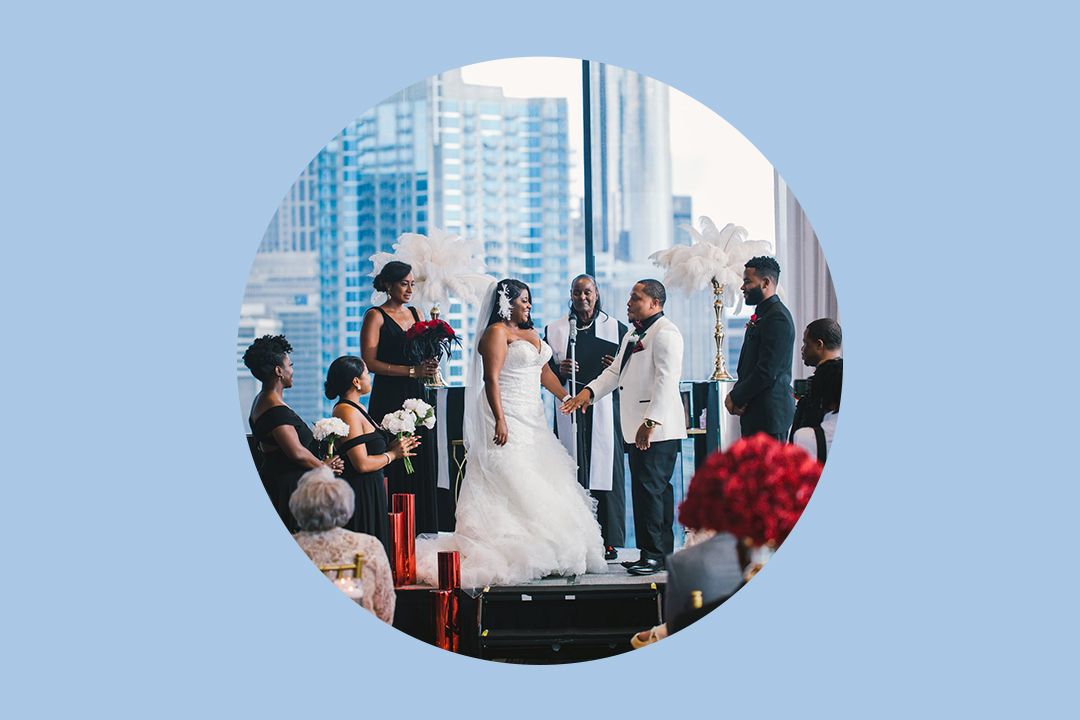
The First Look ✨
- A wedding party is the group of people chosen by the couple to support them from engagement to marriage.
- Siblings, close family members, and best friends are often chosen to be part of the wedding party.
- The bridal party is the group chosen by the bride to support her on the wedding day.
- Some members of the wedding party have specific roles, like the best man who might be expected to plan the bachelor party, or the maid of honor who is often expected to plan the bridal shower and bachelorette party.
A wedding party is a group of people chosen by the couple to support and celebrate them throughout their journey from engagement to marriage. The people chosen to be in a wedding party are typically close friends and family members of the bride(s) or groom(s). They are responsible for certain duties, both before and during the big day. Some of these wedding party duties include:
- Planning pre-wedding activities such as showers and bachelor/bachelorette parties.
- Helping the bride and/or groom get dressed and ready on the big day.
- Participating in the ceremony by standing nearby after the bride’s grand entrance until after the couple exchanges their vows.
- Historically, members of the wedding party would be the witnesses to a marriage, and would sign off on any sort of legal documentation necessary.
What’s the Difference Between a Wedding Party and a Bridal Party?
- A wedding party is the term for the entire group of people who participate in the ceremony alongside the couple—the maid of honor, best man, bridesmaids, groomsmen, and any children such as the flower girl or ring bearer.
- The bridal party, is just the group chosen by the bride to support her on the wedding day.
Traditionally, bridal party members are made up of only women. However, as more and more couples are choosing to do things in their own way, the bride is no longer confined to choosing just women to be in her support crew. Thus the term “wedding party” (or even “commitment crew”) is the more modern, all-inclusive term used to describe the people chosen by the couple to surround and support them on their special day.
Who Should Be in My Wedding Party?
There are three categories of people who are usually included in the wedding party:
- Siblings: Any siblings, including step-siblings or future siblings-in-law, are often first on the wedding party list.
- Close family: Cousins or other relatives near in age to the couple are also often a good fit for the wedding party.
- Best friends: The bride and/or groom’s dearest pals are another good choice for the wedding party—but they should be friends that have, or will, stand the test of time. Keep in mind these are the people that will be in your wedding photos forever!
Traditional Wedding Party Roles
At weddings with a "head table," the wedding party sits with the bride and/or groom. With a "sweetheart table", the couple is seated separately from their wedding party, but their closest friends and family are still in close proximity.
Here’s a quick breakdown of the titles and roles you’ll find in a traditional wedding party, as well as lengthier explanations for what each of these roles are expected to do.
- Pro Tip: While these are the textbook divisions of matrimonial labor, however you choose to assign responsibilities is completely up to you and your partner. If you want to plan your own bachelorette party, skip it entirely, or skip having a wedding party for that matter, do what feels right for you. However you seek outside support during your wedding planning, make sure you articulate nicely and clearly what you need from each of the important people in your life so that they can help you have the meaningful, important day you’re hoping for.
Quick Look at Traditional Wedding Party Roles
- Best Man: the groom’s main dude.
- Groomsman: the groom’s auxiliary dudes.
- Maid of Honor: the bride’s main lady.
- Matron of Honor: the bride’s main lady, but she’s married.
- Bridesmaid: the bride’s auxiliary ladies.
- Junior Bridesmaid or Junior Groomsman: usually tween-age family members or children of the bride and groom’s closest
- Flower girl or boy: usually somewhere between the ages of 3 and 12; petal-tossers.
- Ring Bearer: usually somewhere between the ages of 3 and 12; ring or sign holder.
Detailed Look at Traditional Wedding Party Roles
-
Best Man: A close friend of the groom, the best man is predominantly responsible for the social aspect of the groom’s wedding party. He is expected to:
- Plan the bachelor party.
- Attend the wedding rehearsal
- Help keep the groomsmen on time throughout the big day.
- Help out the groom and make sure he has everything he needs.
- Assist with things like handing out programs to wedding guests or ushering before the ceremony.
- Serve as keeper of the wedding rings (including handing them over at the correct moment during the wedding ceremony).
- Give a speech during the reception.
- Share in the regular groomsmen’s responsibilities.
-
Maid or Matron of Honor: Traditionally, the maid (or matron) of honor attends all pre-wedding events that the bride attends. Here are the maid of honor’s expected duties:
- Help plan or host the bridal party luncheon.
- Attend the wedding rehearsal.
- Help plan or host the bridal shower.
- Help plan or host the bachelorette party.
- Make sure all the bridesmaids are ready with their bridesmaid dress, hair, with hair and makeup and on time on the wedding day.
- Provide refreshments during getting-ready hours.
- Hold the bride’s bouquet during portions of the ceremony.
- Help the bride navigate the bathroom in her dress.
- Bustle the bride’s wedding dress before the reception.
- Give a speech during the reception.
- Shares in the regular bridesmaids’ responsibilities.
-
Bridesmaids & Groomsmen: These wedding attendants share many of the same duties. Both bridesmaids and groomsmen are expected to:
- Attend—and perhaps even plan—pre-wedding events such as the engagement party, bachelor or bachelorette parties, wedding showers, and wedding rehearsals.
- Buy appropriate wedding attire and accessories.
- Buy the couple a wedding gift.
- Get ready with the bride or groom on the wedding day.
- Process down the aisle and/or stand next to the couple.
- Act as stand-in hosts as needed during the reception.
- Hit the dance floor when requested.
- Occasionally give a speech at the wedding reception.
-
Parents of the Bride(s) or Groom(s): Traditionally, the bride’s parents and/or groom’s parents are expected to be involved in both the wedding planning, wedding rehearsals, and the actual wedding day itself, and may also share financial responsibility for part or all of the wedding. The parents of the bride and groom typically:
-
Serve as point people for extended or out-of-town families.
-
Serve as point people for guests who need extra assistance during the wedding ceremony and reception.
-
Some or all of the parents will give a toast at the rehearsal dinner and wedding reception, welcoming their new child-in-law and celebrating the union of their two families.
-
Mother of the Bride: The bride’s mother can serve a similar role to the MOH in that she provides an extra level of support throughout the wedding planning process. Mothers of the bride usually help shop for the wedding dress, the bride’s necklace, costumes, and other important garments; she may also have a hand in planning the bridal shower, rehearsal dinner, and possibly a bridal luncheon for the bridal party and close female family members. On the wedding day, she helps the bride get ready, may walk her daughter down the aisle, and participate in the first dances.
-
Mother of the Groom: The groom’s mother may perform some or all of the above functions, though she usually plays a slightly smaller role than the mother of the bride. The mother of the groom takes part in the mother-son dance.
-
Father of the Bride: The bride’s father typically plays a smaller role in the run-up to the wedding, but has several duties on the day of the wedding. Some families choose to have a “first look” with the father of the bride, which allows the bride and her dad to spend some quality time together before the ceremony. The father of the bride often walks his daughter down the aisle and “gives her away” at the altar, either by himself or with the mother of the bride. He will also take part in the father-daughter dance.
-
Father of the Groom: The groom’s father’s role is often even more limited, though in recent years more and more grooms have included their fathers as members of their wedding party or even asked their dads to serve as their best men.
-
-
Other Family and Friends: Between (step)parents, siblings, grandparents, aunts, uncles, and cousins, you might have a whole horde of family knocking down your door to celebrate you and your partner on your special day...and that’s not even counting all your dear friends. Whether to choose to have a wedding party or not, you can find ways to expand your VIP roster by honoring your loved ones with specific roles or responsibilities. Here are a few ideas (feel free to get creative with titles):
- Ceremony reader
- Ceremony musician or singer
- Ceremony greeter who hands out programs
- Ceremony usher
- Guest book attendant
- Wedding officiant
- Wedding Dj
Do You Need to Have a Wedding Party?
The short answer is no—having a wedding party is definitely not a requirement if it doesn’t feel right to you and your partner. There are plenty of reasons why a couple might not want any wedding party members: perhaps they have too many friends and family to choose from and don’t want to make tough choices, or perhaps they would prefer to have just the two of them up at the altar for a more intimate moment. If you’re eloping, having a very small wedding, or if this is not your first time getting married, having a wedding party might feel unnecessary. The choice to have a wedding party—and if so, who those people are—is totally up to you.
Up next for you

The Groomsmen Duties: A Full Breakdown
Inspiration
To help your groom’s crew achieve wedding party perfection, here’s a total rundown of both traditional and lesser-known duties that the groomsmen can handle to make your day a breeze.
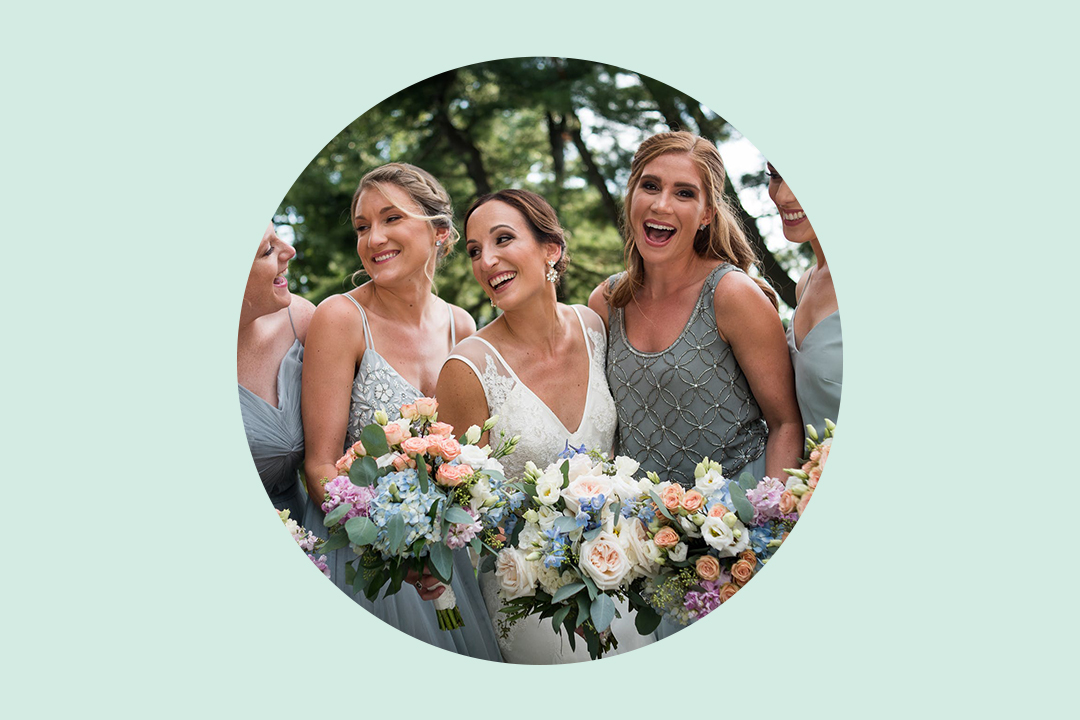
The Bridesmaid Duties: A Full Breakdown
Inspiration
Being a bridesmaid means agreeing to a fairly long list of responsibilities. We’ve put together a comprehensive list of bridesmaid duties.
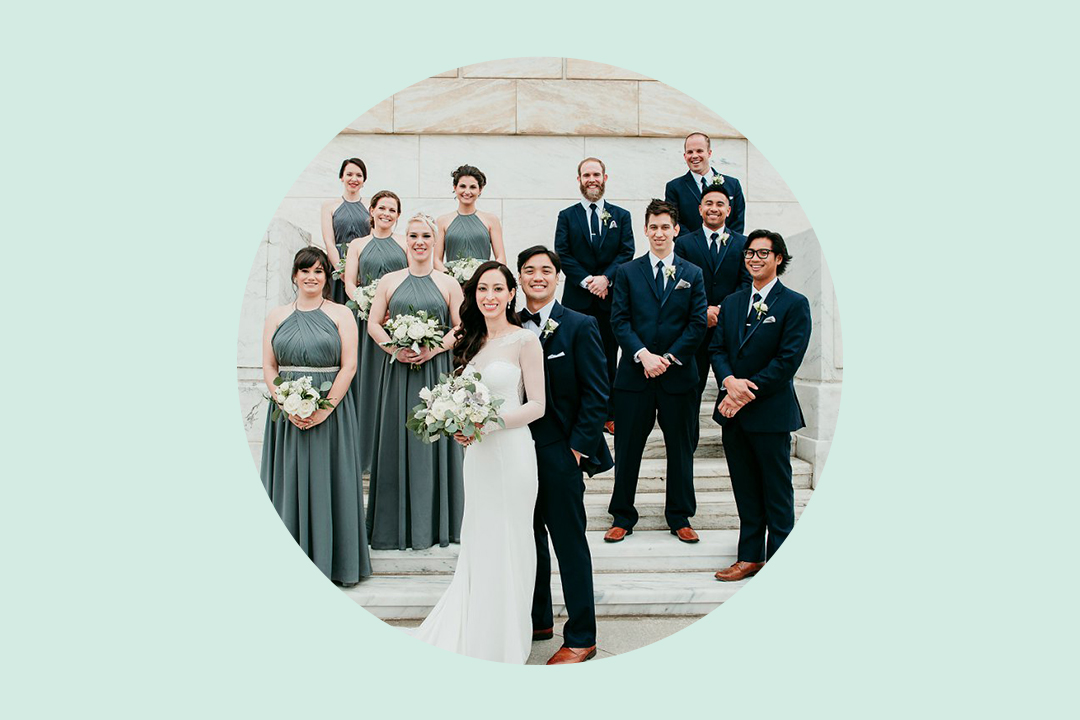
How Many People Should Be In Our Wedding Party?
Advice
You want to include everyone in your wedding party, but you know you can't. If you're having a hard time deciding who and how many, here's exactly how to figure out how many people should be in your wedding party.

How to Write a Wedding Toast: The Ultimate Guide
How-To
Wedding toasts are tricky. We’ve got some helpful tips to guide you towards a great wedding toast that you and your favorite couple will remember fondly for years, so grab your notepads and get ready for some key(note) advice.

A Guide to Bachelorette Parties
Inspiration
Explore creative ideas to plan the perfect bachelorette party weekend. Get tips on how to plan the guest list, budget, itinerary, and more.
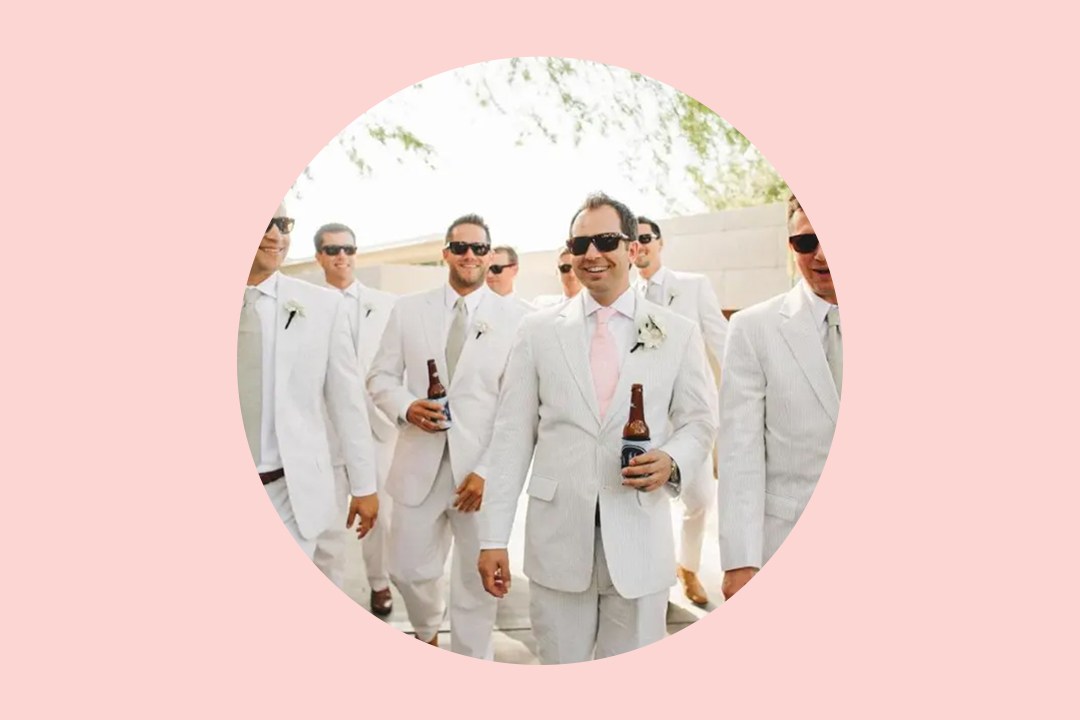
A Guide to Bachelor Parties
Inspiration
Get all your questions about bachelor parties—from who is responsible for planning to what to do—in this comprehensive guide.
Featured

What Is a Registry (And Why Do You Need One)?
Inspiration
A wedding registry is a personalized collection of gifts that an engaged couple has specifically chosen for their guests to shop from in order to make the wedding gifting experience simpler, easier, and more satisfying for everyone.
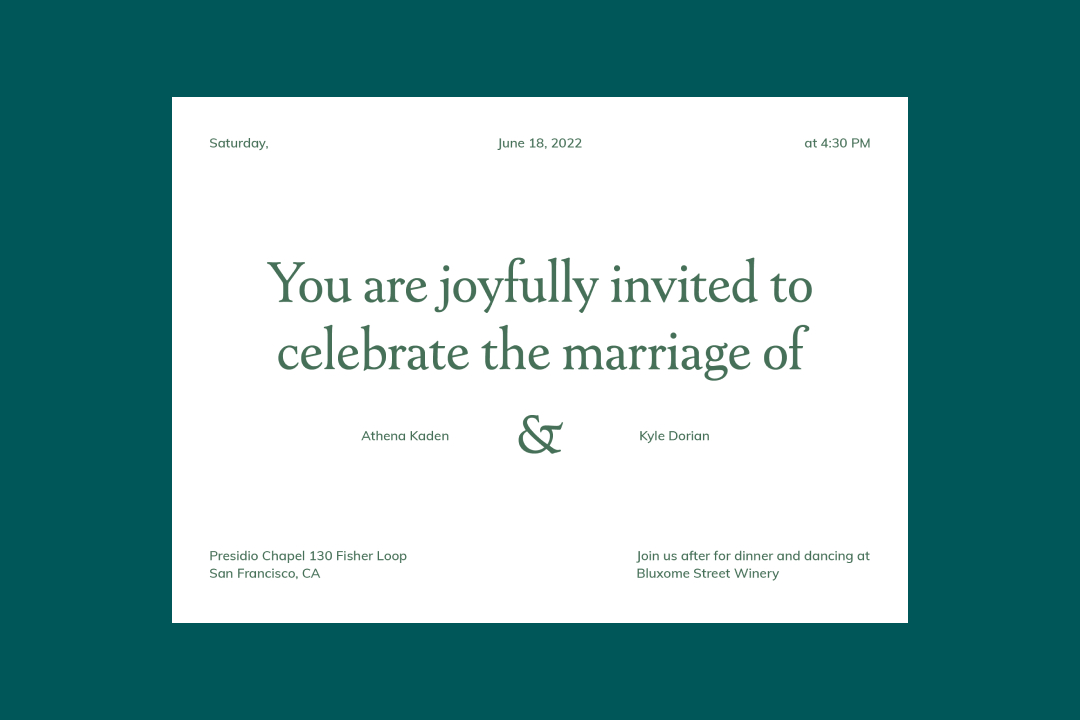
Wedding Invitation Wording: A Complete How-To Guide
How-To
Learn the how-to's of wedding invitation wording, plus formal and casual wedding invitation examples from the experts.

A Guide to Bridal Showers
Inspiration
This bridal shower guide will introduce you to the basics of bridal showers: traditional bridal shower etiquette (and which of those “rules” you can break), whom to invite, what to do, and who pays for it all.

How to Plan a Wedding: A Step-by-Step Guide
How-To
We’ll walk you through the steps of online wedding planning, highlighting all of Zola’s incredibly easy and intuitive online wedding planning tools that’ll make planning for the big day more fun and less frustrating.

Wedding Cake Cost Guide: Average Price and Budget Tips
Advice
Wedding Cake Costs: Discover the national average of $917, typical range of $700 to $1,100, and smart ways to save on your wedding dessert.

Wedding Guest Attire: A Guide to Every Dress Code
How-To
Dress to impress! Your go-to guide for wedding guest attire, from formal to casual. Find the perfect look for every dress code and celebration.
- Expert advice/
- Wedding planning 101/
- Wedding planning questions/
- Bridal Party vs. Wedding Party: What's the Difference?
Find even more wedding ideas, inspo, tips, and tricks
We’ve got wedding planning advice on everything from save the dates to wedding cakes.
